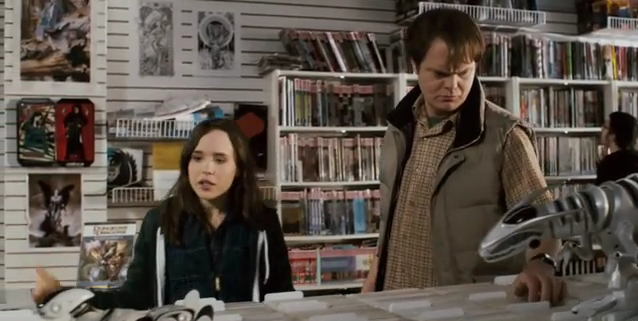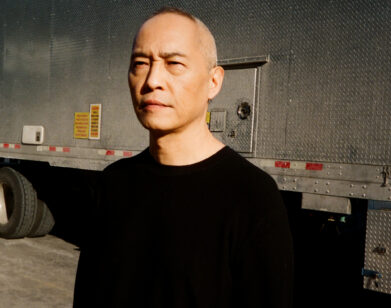Rainn Wilson and James Gunn Make the Hero’s Journey

With the constant barrage of superheroes at the multiplex, it can feel as if we’ve seen it all. This year alone, there’s Green Lantern, Green Hornet, Captain American and Thor, all taking up residences on lunch boxes somewhere. But no Dark Knight or Iron Man comes close to the territory covered in this month’s Super.
Directed by James Gunn and starring the always-game Rainn Wilson, the film follows Wilson’s character’s decision to become a masked crime-fighter after his wife leaves him and God subsequently pays him a visit. While related to last year’s Kick-Ass in that it stars a homemade superhero, Gunn’s Super is probably the first comic book flick to acknowledge how deeply strange it is for a guy clad in Spandex to fight crime. A dark but hilarious take on a superhero’s origin story, the film is helped by Wilson’s ability to ground the film (most of the time) as an a man who is probably crazy but is adamantly sure he is sane. Featuring a crackerjack cast, the film includes Kevin Bacon as the jittery nemesis, Liv Tyler as Wilson’s wife in peril, and a frenetic Ellen Page as his vicious sidekick, Boltie. We caught up with Wilson and Gunn to ask about the film, but ended up mainly playing third wheel.
GILLIAN MOHNEY: James, you said you wrote the first draft of Super in one day—where did that idea come from?
JAMES GUNN: It had been developing for a long time. I knew I wanted to tell a story about a superhero without powers. The question was, did I want to tell a story about a superhero without powers in the real world, or did I want to tell the story of a superhero without powers in the world of superheroes who was trying to fit in? Strictly because of budgetary reasons, I decided on the real world, because I knew it was something that I could do. I was originally going to write it as a short film, and I started to write it as a short film, but the idea kept getting bigger and bigger and bigger as I wrote. It overtook me, and characters like Libby, who ended up being played by Ellen Page, just wanted to be big characters.
MOHNEY: Rainn, you said 20 pages into reading the script, you knew you wanted to do it. Can you talk about what struck you in that first reading?
RAINN WILSON: Sure, when you look at the first act of the movie, there’s so many different genres and styles that are effortlessly woven into one story. It starts out in the real world and then all of a sudden it gets fantastical. There are really funny scenes and you’re like, “Oh, this is a comedy,” then all of a sudden he’s on his knees weeping and praying to God… There’s romance and loss and longing and all this stuff of the human condition. I was in! I didn’t even need to know how it ended and who got blown up or who got killed. I just thought the script was masterful, and I instantly knew how to play that character. That happened with me only few times in my life, where I read something and there’s an instinctual. It’s already rehearsed—I don’t need to work on it. I got it.
MOHNEY: The cast in this the movie is great, and a bit unexpected. Ellen Page is basically the most adorable psychopath you’ve ever seen-
GUNN: That’s perfect, yeah—
MOHNEY: Did you know what you were getting from her when she signed on, or did she surprise you?
GUNN: It was both. I knew who Libby was; she is the “most adorable psychopath you’ve ever seen.” She’s a crazy girl who is so likeable, but you listen to everything she says, and a part of you is saying “I know I shouldn’t like this human being because she really is a sick person, but I love her and she’s funny.” [But] not necessarily funny in the right ways. When Ellen was attached to the film, I really thought, “Yes! Ellen is perfect and she’s going to do great.” But she didn’t audition, so I wasn’t a hundred percent convinced that she was going to pull it off. If Libby doesn’t work, then the movie doesn’t work. It wasn’t until the first day on set, and we shot the first scene with her—where she jumps out of the car in her bra, and it was 14 degrees outside and she was yelling at people and cursing and doing all this crazy stuff—that I was like “Oh my God, it’s going to work. The movie is going to work.”
MOHNEY: So many superheroes have outfits that are so iconic. How did you approach the look for the Crimson Bolt—especially since you scaled it down?
GUNN: We didn’t want the glossy at all. For me, the term I kept using is Frank’s costume is Frankensteinian—
WILSON: That’s not even a word, dumbass—
GUNN: That’s a word I made up!
WILSON: Okay…
GUNN: Anyway, it’s the concept of this guy who can’t sew at all, who is trying to sew his own costume. Getting this creepy patchwork costume—it was a difficult process because we needed a costume that was funny in some scenes and almost terrifying and demonic in some ways.
MOHNEY: What about Nathan Fillion’s costume [as the Christian superhero The Holy Avenger]? Was that a wig on top of the—
GUNN: That was Nathan’s idea; we had a design for the Holy Avenger costume that has fake muscles in it. His costume actually cost way more than the other two costumes, because it’s a real superhero costume that’s well-done. Nathan came in and said, “I have this vision of me with this long flowing hair,” and so we gave him the long flowing hair.
WILSON: That’s hysterical; it’s like this Prince Valiant on top of a cowl.
GUNN: It was so unattractive.
MOHNEY: Rainn, you’re actually more of the straight man in this, until everything goes off the rails. Was that fun for you, to take on a different role in the film?
WILSON: Well, I think what was fun for me, is that there’s a tremendous arc to the character. Where he starts and where he ends is completely different world. He goes on a lot of different journeys on the way. He loves people and loses people and people die and people blow up. But I knew the movie wouldn’t work unless Frank was grounded and relatable, and people loved him and could identify. My job, and I told this to James, I was like “Look, I know how to get laughs out of stuff but I’m not going to focus on that. I’m really going to focus on the heart of the character. If you need me to get laughs or you want me to improvise or need me to do more, let me know, but I’m not naturally going to go to that, because I think that he has to be the steady baseline that drives it forward.”
MOHNEY: Would you ever want to do a sequel?
WILSON: I’ve pitched him on sequel ideas—
GUNN: I doubt it.
WILSON: I don’t think that’s going to happen from the mind of James Gunn. Maybe I could buy the rights?
GUNN: You never know.
SUPER OPENS IN THEATERS TODAY.






